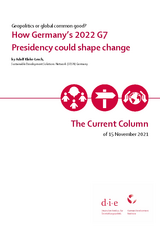Geopolitics or global common good?
How Germany’s 2022 G7 Presidency could shape change
Kloke-Lesch, AdolfThe Current Column (2021)
Bonn: German Development Institute / Deutsches Institut für Entwicklungspolitik (DIE), The Current Column of 15 November 2021
When, in early 2022, the new Federal Government sets its initial international priorities under Germany’s G7 Presidency, the way that the topics are tackled and the political positioning of the G7 process itself will be at least as important as the ambition level of those topics. Like the German Presidencies of 2007 (Heiligendamm/G8) and 2015 (Elmau/G7), the 2022 Presidency could also come at a turning point for the G7 and G20. Will the G7 live up to its responsibility for the global common good or will it turn into an instrument of geopolitical self-assertion?
The Heiligendamm Dialogue Process in 2007 saw Brazil, China, India, Mexico and South Africa brought on board for an initial structural opening of the G8. Just one year on, the world was a different place. During the financial crisis, the G20 was elevated for the first time to the Leaders’ level and declared itself in 2009 to be the premier forum for their international economic cooperation. This marked the end of the G8 as the hub of global economic coordination and also halted its expansion. On the contrary, just a few years later, Russia was expelled from the group due to its annexation of Crimea, making the 2015 Elmau Summit the first regular gathering to be held in the previous G7 format. With no key economic policy role and without the major emerging economies and Russia, the G7 began to reinvent itself as a community of values standing for freedom and democracy and as an instrument for upholding sovereignty and territorial integrity. At the same time, Elmau continued the tradition of a focus on the global common good as well as on Africa, and also helped the G7 states to prepare themselves for the adoption of both the 2030 Agenda with its 17 Sustainable Development Goals (SDGs) and the Paris climate agreement that same year.
However, it remained unclear in subsequent years how the G7’s leadership aspirations and range of topics related to the often parallel and broader G20 processes. Brexit and the Trump administration also further revealed serious problems within and between the G7 countries. Summit declarations became more superficial, documented open dissent or were revoked. During the US G7 Presidency in 2020, a G7 summit failed to materialise. Resuming the G7 process under its Presidency in 2021, the UK has drawn on the traditional common good emphasis, yet also orchestrated a new geopolitical setting. With India and Australia, alongside South Korea and South Africa, the UK not only invited several other G20 countries to a G7 summit once more, but also introduced the Indo-Pacific Quadrilateral Security Dialogue to the G7. This led observers to speak of the first summit of the anti-China coalition, something also being underscored by the design of the US proposal for a new global infrastructure initiative adopted at that summit.
Rather than continuing down the road of transforming the G7 into an anti-China alliance or bloc forming within the G20, the German G7 Presidency should coordinate closely with France, Italy and the EU to place the focus on assuming responsibility for the global common good and strengthening cooperation within the UN and G20 frameworks. Having held the G7 and G20 Presidencies within two years of one another (in 2015 and 2017 respectively), Germany has also gained positive experience of constructively linking the two processes. Inviting more G20 countries to attend the G7 as guests again would be detrimental to this and undermine the G20 process. Instead, G20 Presidency holder Indonesia should be the sole guest, with the aim of ensuring that the G7 process helps to make the G20 a success. There is barely a problem of our time that can be solved without China and Russia. This is similarly true of Africa. Agreeing to advocate at the G20 for the admission of the African Union as a full member would thus be more important than conducting another G7 Africa outreach.
It is precisely because democracy and social justice are under pressure and tensions are rising globally that the G7’s shared values must not be used as an instrument of geopolitical confrontation, but rather strengthened primarily at home and put into practice credibly in open formats. A special meeting should be held with the G7 Engagement Groups at the G7 Summit to address this challenge. The G7 states will also be able to discuss democracy more effectively at multilateral levels the more openly and clearly they do so among themselves.
Additionally, the G7 countries should contribute to the global common good, also with a view to climate and biodiversity, primarily through transformations at home. The group must set its own course in 2022 so as to allow it to pivot into a decade of effective implementation following the pandemic and before the 2023 SDG Summit. The urgent need for financial pledges to third parties must not distract from the necessity of decarbonising economic relations between the G7 nations themselves and switching to sustainable production and consumption. While all G7 states bar the US have submitted at least one Voluntary National Review on implementation of the 2030 Agenda, the SDGs continue to play only a marginal role in their national policies. The G7 Summit in 2022 should alter this. The power to shape change develops when words are followed by deeds.


